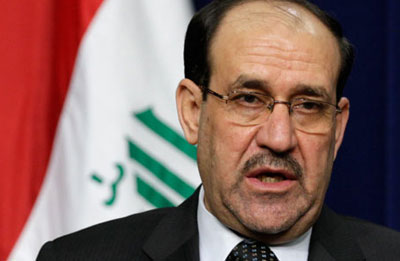
Iraq PM backs Syrians' wish for reform
Baghdad, September 15, 2012
Iraqi Prime Minister Nuri al-Maliki told a Syrian opposition delegation on Friday Baghdad supports the Syrian people's wish for legimate change, saying Iraq's power-sharing experience after the 2003 invasion could offer them lessons.
The meeting showed the political tightrope Shi'ite Muslim-led Iraq walks over Syria, where Sunni Muslim rebels backed by Arabs are fighting President Bashar Assad, whose family is Alawite, a branch of Shi'ite Islam, and backed by Shi'ite Iran.
Maliki's government has said it backs neither side in the Syrian conflict. But Iraqi Shi'ite leaders fear that if Assad falls, Syria would splinter along sectarian lines and this would bring about the rise of a hardline Sunni regime likely to upset Iraq's fragile security and Shi'ite-Sunni mix.
Close to Iran himself, Maliki has taken a more muted stance on Syria. He has not joined calls for Assad to quit, much less enforce sanctions against Damascus approved by the Arab League, but has called for reforms to end one-party rule in Syria.
"They (Maliki and Syrian opposition group) discussed Syria's crisis and ways to stop the bloodshed and find a solution that achieves the legitimate aspirations of the Syrian people," the prime minister's office said in a statement.
Maliki told the delegation, which included members of the Syrian National Council, to take advantage of the Iraqi experience after the demise of Sunni dictator Saddam Hussein in the US-led 2003 invasion.
Ali al-Moussawi, Maliki's media adviser, said the meeting was not the first time Baghdad government leaders had met with Syrian opposition.
"We are with the demands of the Syrian people. We confirmed to the delegation that we are with them, stand with them, but we will never dictate to them and will not interfere in their affairs," he said.
Iraq's violence has subsided dramatically since 2006-07 when the country sank into sectarian slaughter that pitched Sunni against Shi'ite and dragged Iraq close to civil war.
A fragile power-sharing agreement amoung Sunni, Shi'ite and Kurdish factions has replaced Saddam's one-party rule. But Iraq's cross-sectarian government has been mired in crisis even before the last US troops left in December.
Since the fall of Saddam and the rise of Shi'ite leaders, many Iraqi Sunnis feel they have been sidelined. Sunni politicians accuse Maliki of failing to fulfil US-backed deals to share power, a charge his backers dismiss.
Sunni Islamist insurgents and a local Al Qaeda wing still fight the government. Bombings and attacks across Iraq killed more than 100 people on Sunday.
Syria is mainly Sunni Muslim, but also has minority Alawite, Christian and Kurdish populations.
Saudi Arabia and Qatar as well as Turkey oppose Assad while Iran supports him. Those splits have complicated diplomatic efforts to halt the fighting in Syria, which threatens to become a proxy battlefield for outside powers.-Reuters







